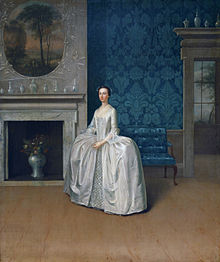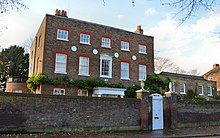
Summary
Lady Juliana Penn (née Fermor; May 21, 1729 – November 20, 1801) was the English wife of Thomas Penn, and she assisted him in the administration of the Colony of Pennsylvania in his later years. She corresponded with John Adams and other leaders of the early United States.
Lady Juliana Fermor Penn | |
|---|---|
 "Lady Juliana Penn (née Fermor)" (1752) by Arthur Devis, from the Philadelphia Museum of Art | |
| Born | Juliana Fermor May 21, 1729 |
| Died | November 20, 1801 |
| Nationality | English |
| Known for | wife of Thomas Penn, mother of John Penn and Granville Penn |

Early life edit
Lady Juliana was born in 1729, at Easton Neston, Northamptonshire, the fourth daughter of Thomas Fermor, 1st Earl of Pomfret and Henrietta Louisa Jeffreys.
Marriage, family, and colonial relations edit
Juliana Fermor and Thomas Penn married on August 22, 1751. Lady Juliana was almost thirty years her husband's junior. After their marriage, Thomas Penn (formerly a Quaker) attended Anglican church services regularly, though he did not take part in the sacrament of Communion.[1] The Penns lived at Stoke Park, Buckinghamshire. The Penns had eight children; four of them died in infancy or childhood, and daughter Juliana died in childbirth at age 19.[2]
Thomas Penn experienced declining health in the early 1770s, and as their sons John Penn and Granville Penn were still very young, Lady Juliana took an active role in maintaining the proprietorship of Pennsylvania. She corresponded with Governor John Penn and other colonial officials, including discussing maps and other materials of administration.[3][4]
In March 1775, Lady Juliana was widowed, and was appointed co-executor of her husband's personal estate.[5] Soon after, events of the American Revolutionary War complicated her family's fortunes,[6] and she wrote frequently to American leaders such as Henry Laurens and John Adams about "the cause of an Innocent and Suffering Family."[7][8] Lady Juliana and her co-executor William Baker also took an active interest in the survey of Susquehanna Land Company holdings in the Wyoming Valley, and wrote to James Tilghman expressing their hopes for a favorable outcome.[9] The Reverend Jacob Duché wrote to Benjamin Franklin about visiting "my most Amiable Friend Lady Juliana Penn," during an official trip to England in 1783.[10] John Jay wrote to Lady Juliana from the Treaty of Paris (1783) negotiations, to keep her apprised of their progress.[11]
Lady Juliana Penn died in 1801, aged 72, at Beaufort House, Ham. Her remains were buried with her husband's and with her children's, at Stoke Poges.
Legacy edit
Lady Juliana sat for three portraits with Sir Joshua Reynolds, in 1755, 1764, and 1767.[12] A 1752 portrait of Lady Juliana by Arthur Devis is held by the Philadelphia Museum of Art.[13] The Juliana Library Company of Lancaster, Pennsylvania was named in 1763 for Lady Juliana Penn, because she donated books to the subscription library's collections.[14]
A memorial urn to her was created by James Wyatt and commissioned by her son, John Penn.[15] It is located in the Grade I Designated Stoke Poges Memorial Gardens which was part of the Penn estate of Stoke Park, Stoke Poges.[16]
References edit
- ^ Howard Malcolm Jenkins, The Family of William Penn, Founder of Pennsylvania, Ancestry and Descendants (1899): 145.
- ^ Howard Malcolm Jenkins, The Family of William Penn, Founder of Pennsylvania, Ancestry and Descendants (1899): 151.
- ^ Lorett Treese (20 November 1992). The Storm Gathering: The Penn Family and the American Revolution. Penn State University Press. p. 144. ISBN 978-0-271-03856-8.
- ^ Penny L. Richards, "'Could I but Mark out my Own Map of Life': Educated Women Embracing Cartography in the Nineteenth Century American South," Cartographica 39(3)(Fall 2004): 3.
- ^ Howard Malcolm Jenkins, The Family of William Penn, Founder of Pennsylvania, Ancestry and Descendants (1899): 153.
- ^ Lorett Treese, Storm Gathering: The Penn Family and the American Revolution (Penn State Press 2010): 148. ISBN 0811730697
- ^ Lady Juliana Penn to John Adams, 24 December 1782, Papers of John Adams, Massachusetts Historical Society.
- ^ David C. Chestnutt and C. James Taylor, eds., The Papers of Henry Laurens, September 1, 1782-December 17, 1782 (University of South Carolina Press 2003): 67. ISBN 1570034656
- ^ Philip J. Schwarz (1 January 1979). The Jarring Interests: New York's Boundary Makers, 1664–1776. SUNY Press. p. 177. ISBN 978-1-4384-4575-5. ISBN 0873953770
- ^ Jacob Duché Jr. to Benjamin Franklin, January 28, 1783, in The Papers of Benjamin Franklin January 21 to May 15, 1783 (Yale University Press 2009): 74. ISBN 0300134487
- ^ John Jay (1793). The Correspondence and Public Papers of John Jay ...: 1782–1793. G.P. Putnam's Sons. p. 3. ISBN 9780598775849.
- ^ Algernon Graves; William Vine Cronin; Sir Edward Robert Pearce Edgcumbe (1899). A History of the Works of Sir Joshua Reynolds, P.R.A. subscription. p. 747.
- ^ Arthur Devis, "Portrait of Lady Juliana Penn," Philadelphia Museum of Art website.
- ^ Charles I Landis and Thomas Penn, "The Juliana Library Company of Lancaster," Pennsylvania Magazine of History and Biography 43(1)(1919): 24-52.
- ^ "Urn Commemorating Lady Juliana Penn (1729–1801) | Art UK". artuk.org. Retrieved 16 February 2023.
- ^ "STOKE POGES GARDENS OF REMEMBRANCE, Stoke Poges - 1001255 | Historic England". historicengland.org.uk. Retrieved 16 February 2023.


